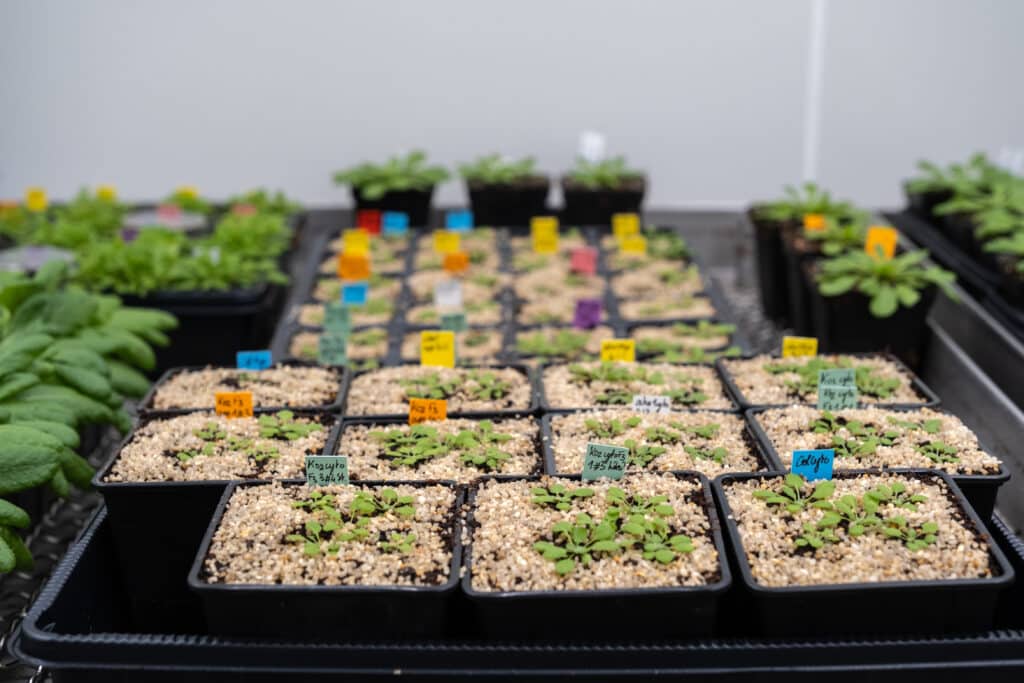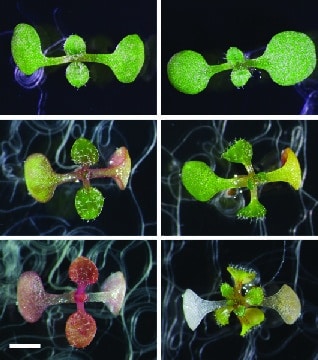To survive, plants must be able to withstand sudden and sometimes harsh changes in their environment because they cannot move away. A small molecule called guanosine tetraphosphate (ppGpp) may help plants to do this. ppGpp is best known in bacteria where it plays a major role in helping them adapt to environmental change. ppGpp is also present in plants, inside the chloroplast, the place within cells where photosynthesis happens. Photosynthesis is the process that fuels plant growth and nearly all life on earth by converting sunlight into chemical energy.
Although it had not been proven, there were hints that ppGpp might be involved in plant resistance to deficiency in nitrogen, an essential nutrient for plant growth.
Researchers at the BIAM wanted to determine whether ppGpp really plays a role in protecting plants and helping them to grow in a nutrient-poor environment.

So, the researchers examined mutants of Arabidopsis thaliana, a model plant widely used in the laboratory. These plants had defects in the production of ppGpp. When grown in a nitrogen-poor medium, the mutant seedlings suffered oxidative damage and cell death. Through a series of biochemical, molecular and genetic experiments, the researchers were able to demonstrate that ppGpp was required to reduce photosynthetic activity and chloroplast gene expression.
Researchers at the BIAM wanted to determine whether ppGpp really plays a role in protecting plants and helping them to grow in a nutrient-poor environment. So, the researchers examined mutants of Arabidopsis thaliana, a model plant widely used in the laboratory. These plants had defects in the production of ppGpp. When grown in a nitrogen-poor medium, the mutant seedlings suffered oxidative damage and cell death. Through a series of biochemical, molecular and genetic experiments, the researchers were able to demonstrate that ppGpp was required to reduce photosynthetic activity and chloroplast gene expression.

The team demonstrated that this mechanism protects plants by helping them to withstand the impact of nitrogen deficiency: “This shows that the production of ppGpp is essential for the survival of plants to nitrogen limitation and probably other sudden changes in their environment,” says Shanna Romand, first author of the discovery and a doctoral student at BIAM.
As the climate changes and becomes more unpredictable, as concerns grow over the impact of crop production on the health of the planet, and as the challenges of feeding a growing human population increase, it is vital that we should understand better how plants adapt to environmental stress. “It is thanks to this kind of research that we will be able to develop effective strategies for helping crop plants become more tolerant to environmental constraints and less dependent on artificial fertilizers,” adds Benjamin Field, a BIAM researcher and the corresponding author of the discovery. “Now that we understand the importance of ppGpp, the next step is to use this knowledge to better guide improvements in crop resilience.”
Autors : Shanna Romand, Hela Abdelkefi, Cecile Lecampion, Mohamed Belaroussi, Melanie Dussenne, Brigitte Ksas, Sylvie Citerne, José Caius, Stefano D’Alessandro, Hatem Fakhfakh, Stefano Caffarri, Michel Havaux, Ben Field
REFERENCES
https://doi.org/10.7554/eLife.75041
Laboratories involved
BIAM / LGBP et SAVE
INRAE-IJPB
IPS2 (INRAE, CNRS, U Paris Saclay)
Université Tunis El Manar
Université de Carthage
ANR-17-CE13-0005
ANR-17-EUR-0007
BIAM contact: ben.field@univ-amu.fr
Scientific interest group (GIS) « Biotechnologies Vertes » Contact : durand-tardif@genoplante.com